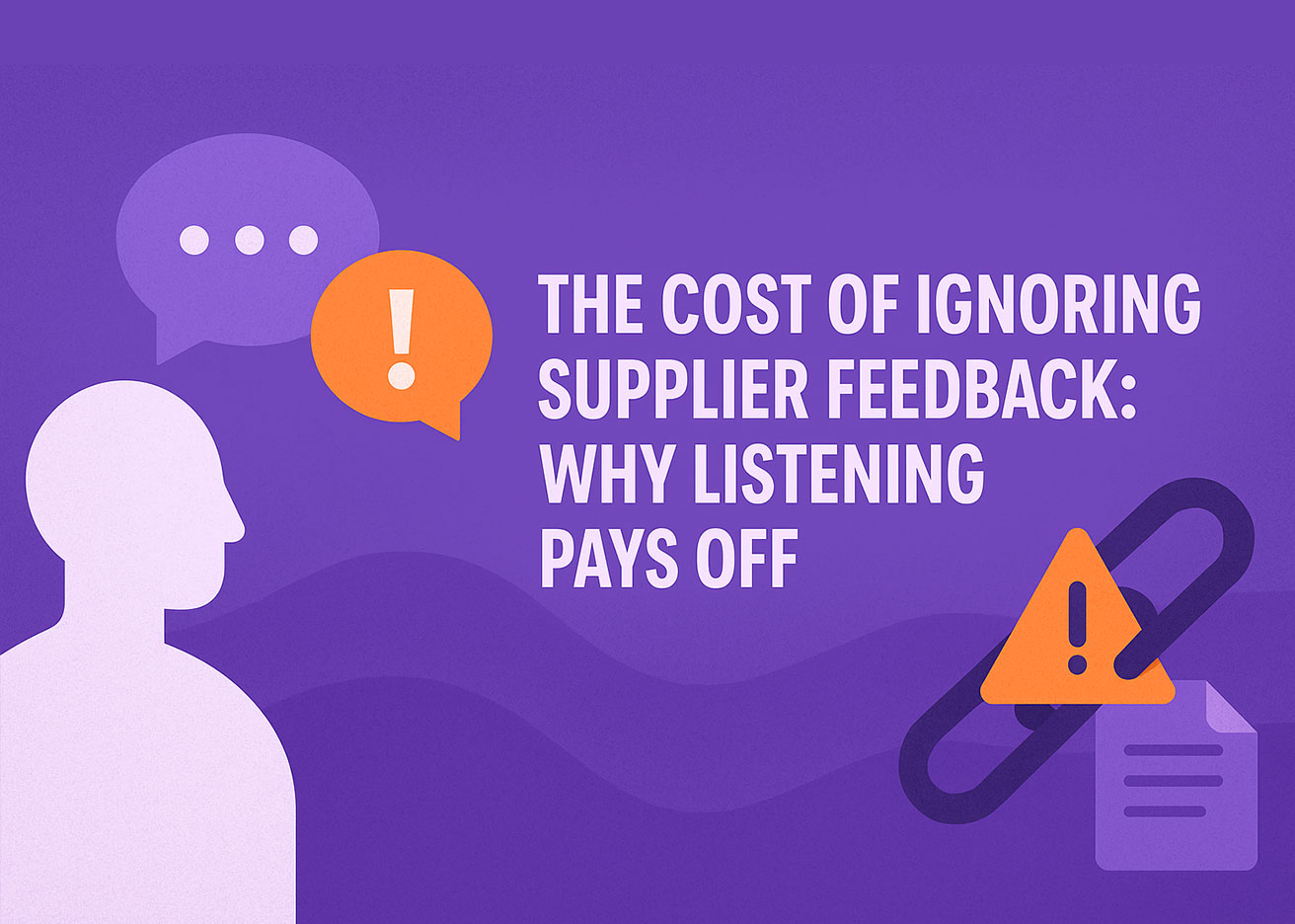The Cost of Ignoring Supplier Feedback: Why Listening Pays Off in Long Run
When businesses talk about “improvement,” the focus often turns inward – refining processes, boosting productivity, or enhancing customer experience. But one of the most underused sources of improvement lies just outside your organization: your suppliers.
Suppliers are not just vendors fulfilling purchase orders; they are strategic partners with a front-row view of how your business operates. Ignoring their feedback doesn’t just mean missing out on a few suggestions – it can quietly cost you efficiency, money, and trust.
Let’s explore why listening to supplier feedback pays off – and how it can become a powerful tool for uncovering blind spots and driving long-term success.
1. Suppliers See What You Don’t
Suppliers interact with your teams, processes, and systems daily. They notice where communication slows down, where documentation gets confusing, or where decision-making takes too long.
When you dismiss supplier feedback, you risk missing valuable operational insights that your internal team might overlook. For instance, a supplier pointing out delays in approvals could highlight inefficiencies in your procurement workflow. Or feedback about unclear technical specifications could signal communication breakdowns between departments.
By creating channels to capture and act on such feedback, you open a direct line to improving your internal efficiency.
2. Ignoring Feedback Damages Relationships
Strong supplier relationships are built on trust and mutual respect. If suppliers feel that their voices don’t matter, it sends a clear message – that your business values transactions more than collaboration.
Over time, this attitude leads to reduced engagement and lower performance. A disengaged supplier is less likely to go the extra mile when you need urgent deliveries or custom solutions. Conversely, when suppliers know their feedback is valued, they’re more likely to invest in innovation and support your strategic goals.
3. Feedback Highlights Process Blind Spots
Every organization has blind spots – those areas where processes seem fine internally but cause friction externally. Supplier feedback acts as a mirror that reflects how your operations impact others in your ecosystem.
For example:
- If suppliers consistently mention late payments, it could signal inefficiencies in your accounts payable system.
- If they raise concerns about changing demand forecasts, it might indicate a need to improve internal demand planning.
- If they find your onboarding process confusing, your supplier management system might need simplification.
Listening helps you uncover these weak points before they grow into bigger problems affecting cost, delivery, or compliance.
4. Ignored Feedback Equals Hidden Costs
Disregarding supplier feedback can lead to real financial consequences. Delays, rework, and miscommunication add up – not only in dollars but in wasted time and lost opportunities.
Suppliers who feel unheard might deprioritize your orders or charge higher prices to offset perceived risk. Over time, this can escalate into supplier churn, forcing you to onboard and train new partners – a process that’s both expensive and time-consuming.
Simply put, listening isn’t just about being polite; it’s a cost-saving strategy.
5. Listening Drives Innovation
Suppliers often serve multiple clients across industries. That means they see trends, technologies, and process improvements before many buyers do. Their feedback can help you spot opportunities for innovation – whether it’s adopting new materials, exploring automation, or improving sustainability practices.
By turning supplier feedback into actionable insights, companies can stay ahead of competitors and strengthen their supply chain resilience.
6. Building a Culture of Two-Way Communication
To make supplier feedback truly valuable, organizations must create a structured feedback ecosystem. Here’s how to start:
- Conduct regular supplier surveys focused on collaboration, efficiency, and satisfaction.
- Hold quarterly performance reviews that include open dialogue, not just scorecards.
- Encourage anonymous feedback to surface honest insights.
- Act visibly on feedback – let suppliers see how their input leads to change.
When suppliers witness tangible improvements based on their feedback, they feel more engaged and invested in your success.
7. Turning Feedback into a Competitive Advantage
Companies that integrate supplier feedback into their performance management gain more than goodwill – they gain data-driven clarity. Over time, feedback trends reveal patterns that inform better decision-making, from refining procurement policies to strengthening partnerships with top-performing suppliers.
Moreover, proactive listening positions your business as a preferred customer. Suppliers prioritize businesses that respect their input, leading to better pricing, flexibility, and innovation support.
Conclusion: Listening is Strategic, Not Optional
Ignoring supplier feedback isn’t a neutral act – it’s a decision that carries measurable costs. From strained relationships and inefficiencies to missed innovation opportunities, silence can be expensive.
Listening, on the other hand, builds transparency, strengthens relationships, and uncovers pathways to operational excellence. When companies treat supplier feedback as a strategic resource, they not only optimize their supply chain but also create a culture of continuous improvement that benefits everyone involved.
Because in business, as in any partnership, the simple act of listening often pays the biggest dividends.


